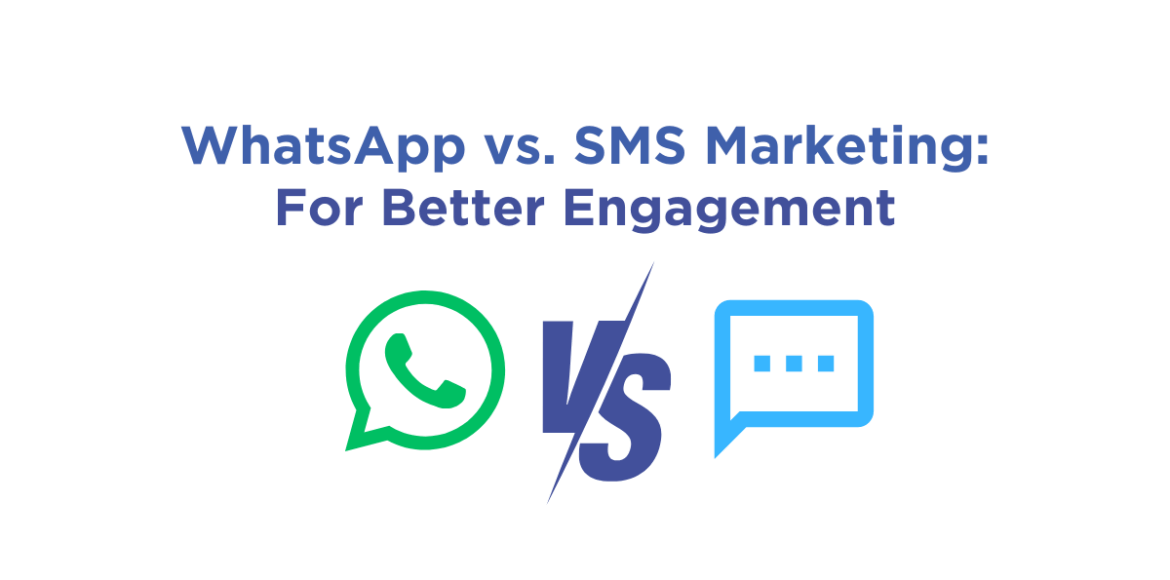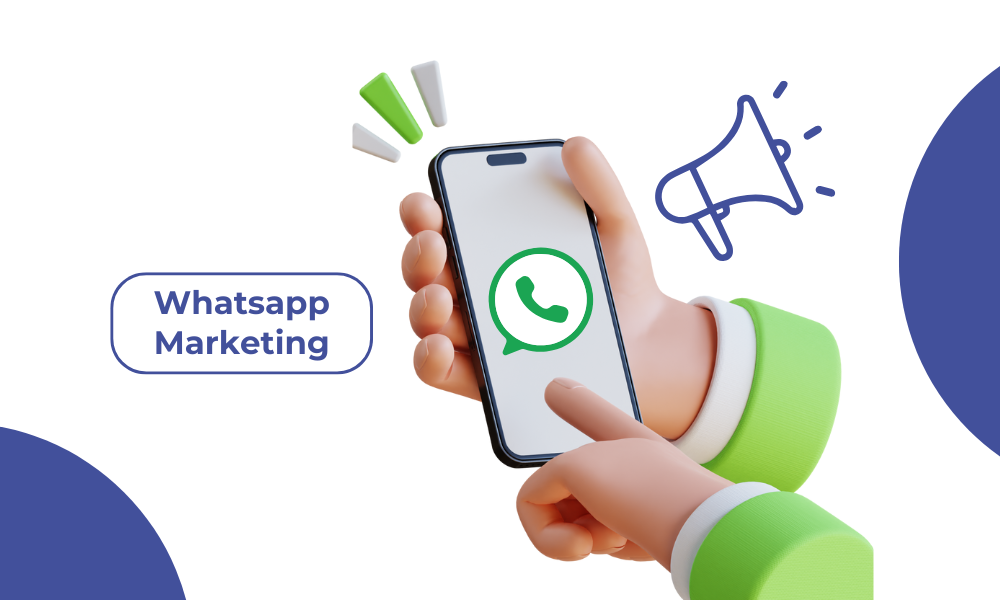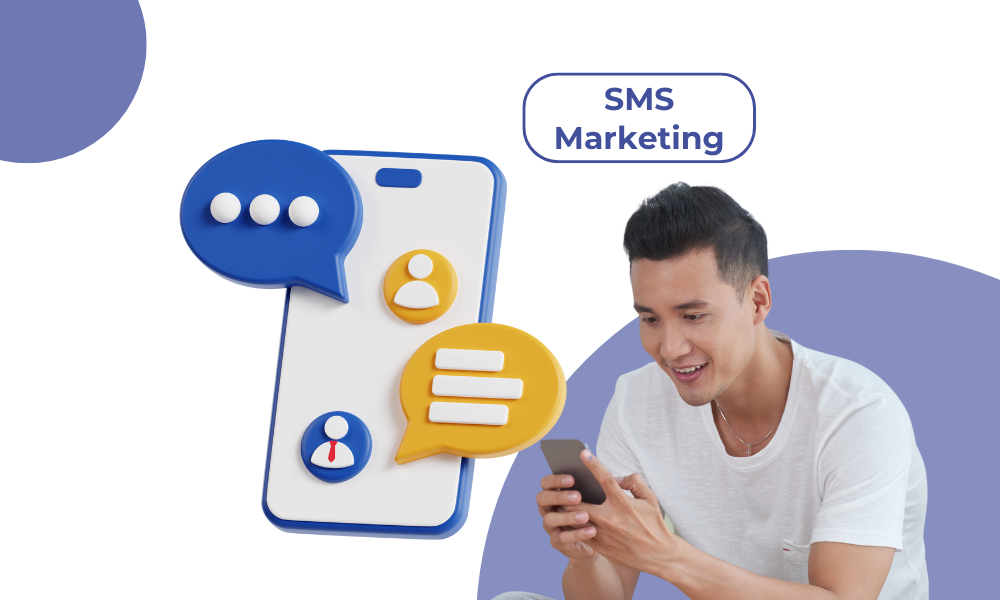WhatsApp vs. SMS Marketing: A Comparison for Better Engagement

WhatsApp and SMS marketing are two of the most powerful channels businesses can use to engage with customers. In today’s digital world, where consumers are flooded with information on everything, having the right channel to communicate is a key to success. Both WhatsApp marketing and SMS marketing have unique features that can help businesses reach their target audience, give them information about their products and share updates. Today, we’ll walk you through a detailed comparison of WhatsApp marketing vs SMS marketing: its features, engagement rates and performance as a marketing channel so you can decide which is appropriate for your business and marketing strategy.
WhatsApp Marketing

WhatsApp marketing is the use of the WhatsApp platform to interact with a customer, where you get to promote your products to your customers, support the customer, and build brand loyalty. Launched in 2009, WhatsApp has become one of the most popular messaging applications due to its simplicity, user-friendly interface, and cross-platform compatibility. Having over 2 billion active users across the globe, WhatsApp is ideal for businesses to reach larger and diversified audiences.
SMS Marketing

SMS marketing uses text messages for promotional purposes, reminders, alerts, or customer service messages to customers. Developed in the early 1990s, the Short Message Service (SMS) is one of the most widely used marketing tools, making it possible to reach out even to non-internet-enabled mobile phones. SMS marketing is relevant to date due to its immediacy and high open rates.
Understanding WhatsApp Marketing: Messaging with Impact
WhatsApp marketing is one of the powerful tools that allows businesses to interact with customers through personalized messaging on one of the world’s most popular messaging platforms. Companies use WhatsApp to connect with users more intimately and conversationally through an effective channel for creating relationships, offering support, and promoting products.
Why WhatsApp Marketing is Effective
- Personalization: WhatsApp makes business messages very personal because it lets businesses communicate with clients one-on-one. Customers feel connected when brands use a familiar platform like WhatsApp.
- High Open Rates: WhatsApp messages have an open rate of 98%, much higher than emails at 20%. This means marketing messages sent through WhatsApp are nearly certain to be read, making it possibly the best medium to deliver promotions, updates, and customer service responses.
- Improved Marketing Features: It supports multimedia messaging that allows businesses to send photos, videos, voice messages and documents, making marketing campaigns more interesting.
- WhatsApp Business API: Medium and big businesses can automate order confirmations, appointment reminders and shipping updates. It increases efficiency and engagement with customers through rapid responses during business hours and beyond business hours.
Key Features of WhatsApp Marketing
Personalized Engagement at Scale
Business-to-consumer marketing with the help of WhatsApp creates personal and meaningful interactions. Businesses can reach customers through text, images, videos, and voice notes via WhatsApp. This ability to send multimedia messaging in various formats makes communication more interactive and interesting and establishes a closer business-to-customer relationship.
Unique Features for Enhanced Engagement
WhatsApp offers read receipts and delivery statuses, enhancing engagement. This serves as an excellent feedback mechanism for understanding how customers engage with the message and allows for improvement of the messaging based on this information.
Security and Trust
Communication in WhatsApp is end-to-end encrypted so that only the sender and the receiver can read the messages. This feature helps build trust with customers encouraging them to share more personal information with the company, making the marketing programs more attractive to the public.
Automation
Businesses can utilize WhatsApp Business API for automation to send messages to hundreds of clients in one go without losing that personal touch of writing to one customer at a time. Automation will save time and resources while sending the message to the customer on their preferred platform in real-time.
Pros and Cons of Using WhatsApp for Marketing
Pros
- High Open Rates: The open rate is over 90%, which means that most users read and respond to the messages almost immediately.
- Personalization: It also allows businesses to send one-to-one, customized messages that help businesses develop stronger ties with their customers through personal interaction.
- Multimedia Messaging: It supports images, video, audio, and documents that can be used in marketing, making campaigns more vivid and interesting.
- Global Reach: With more than 2 billion users around the world, WhatsApp enables businesses to reach a significant, diverse audience, especially in high-usage regions, such as Latin America, India, and parts of Europe and Africa.
Cons
- Limited Broadcast Audience: WhatsApp only allows broadcast messages to 256 contacts at one time, so reaching an audience of that size without help from the WhatsApp Business API is very difficult.
- Lacks built-in analytics: The platform lacks built-in analytics facilities, so third-party integrations have to be used to get updates on the success of campaigns.
- Customer opt-in requirement: WhatsApp marketing runs on customer opt-in, which can only limit the audience size and demands careful list-building efforts.
Key Features of SMS Marketing
Quick and Universal Accessibility
SMS marketing is still one of the dependable and viable options for businesses to reach customers quickly. One of the biggest advantages of SMS marketing is that it can reach the customer, regardless of an internet connection. Most people have a mobile phone that can accept text messages, so it is universally accessible.
Direct and Efficient
SMS marketing is direct and efficient. Companies can send several short, to-the-point messages that are easy to read and understand for customers. It is convenient in today’s fast pace since most people prefer short information rather than long explanations.
High Open Rates
Another advantage of SMS marketing is that it has the highest open rate. According to studies, nearly 90% of text messages get read within minutes of being received. This immediacy gives SMS marketing a particular push to send urgent notifications, reminders, and promotions that require quick action from customers.
Pros and Cons of SMS Marketing
Pros
- Open Rates: In SMS marketing, open rates are around 98%. Most messages are read within minutes, making it simply ideal for urgent or time-sensitive communication.
- Wide Reach: Since SMS can be reached by any mobile device, which is not reliant on smartphone capabilities or the availability of the internet, business outreach to broad audiences can happen even in poorly connected areas.
- Instant Delivery: The delivery of a message is almost instant, making SMS an ideal option for promotions, alerts, or reminders that demand immediate attention.
- Low Cost: The cost of sending SMS is relatively low against the cost of traditional advertising, so firms can affordably reach mass numbers, especially in targeting local campaigns.
Cons
- Character Limitation: 160 characters are allowed for one text message, making business communication difficult.
- Regulations: SMS marketing is regulated, meaning that businesses should get explicit permission from the users and limit the size of the available audience.
- Message Fatigue: It becomes irritating to send multiple SMS promotions to customers, causing them to unsubscribe or ignore future messages.
- Lack of multimedia support: SMS only supports text-based communication and the businesses cannot share rich media such as images or videos, which would be essential in marketing efforts.
Comparative Table: WhatsApp vs. SMS
| Feature | WhatsApp Marketing | SMS Marketing |
| Open Rates | Over 90% | Approximately 98% |
| Message Delivery Speed | Instant (requires internet) | Instant (no internet required) |
| Global Reach | Over 2 billion users globally, but requires app usage | Universal reach to any mobile device with a phone number |
| Multimedia Support | Supports images, videos, voice notes, documents | Text-only with a 160-character limit |
| Cost | Free for users; businesses may incur costs with API | Typically low-cost, but bulk messaging can get expensive |
| Interactivity | Two-way communication, read receipts, typing indicators | Limited interactivity, no read receipts |
| Personalization | Highly personalized with rich media and chat interactions | Personalized to an extent, but text-only limitations |
Conclusion
Both WhatsApp and SMS marketing offer value to a business. An understanding of their strengths will help you decide on a good platform for your target audience and in achieving marketing objectives. Whether you decide on WhatsApp for rich engagement capabilities or SMS for simplicity and immediacy, both tools can significantly improve your marketing efforts.
FAQs
How can WhatsApp be used for marketing?
WhatsApp can be used for marketing by enabling end-to-end direct messaging, sharing multimedia messages including images and videos, offering support to customers, sending promotions or offers, automated responses using the WhatsApp Business API, creating broadcast lists for making announcements or interacting with customers through polls or surveys.
Is WhatsApp Marketing Good?
WhatsApp marketing is highly efficient due to the great engagement rate, customized communication, support for multimedia, and real-time two-way interaction with customers.
Is WhatsApp marketing a social media marketing?
WhatsApp marketing cannot be placed among the techniques of social media marketing. Its strength lies in individual private messaging rather than in public posts and interactions typical of social media.
How Does the Cost of WhatsApp Marketing Compare to SMS Marketing?
The cost of WhatsApp marketing varies. WhatsApp is free for the end-users, but businesses pay for the WhatsApp Business API. The price of messaging is primarily calculated based on how many messages there are. SMS marketing is relatively low-cost, but the potential for inflation can be rapid in the case of mass messages or with international recipients. WhatsApp business may pay less due to how engaging it can be and multimedia features as opposed to pricing SMS marketing per message to send.



